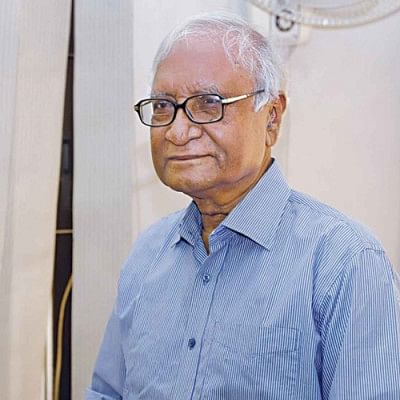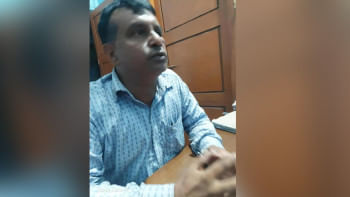‘The state has always deemed universities hostile to its interests’

In your long illustrious career, you've written extensively on many issues, but I find your enduring interest in poverty, rights and justice fascinating. Has there been any personal motivation for pursuing what has been your lifelong crusade against the forces feeding off people's sufferings?
I remember two incidents that profoundly impacted me. These incidents took place about seventy years apart. The first occurred when I was only seven, in 1943. It was the year of the great Bengal famine. People were dying in droves, starved and without help. We lived in our village then. One day, a neighbour who lived across our pond killed himself by hanging from a tree. He had a wife and child to feed but he relented under the suffocating pressure of the famine. I still remember the sight of his hung body moving sideways, nudged by the wind. It still haunts me. The second incident occurred in 2013, again in our village, of which I learned from a news report. It was also a suicide case. A man who had a wife and daughter mixed poison in their food and they all died together. His reason? Microcredit. The family had gotten itself entangled in what we call a debt trap. As the noose around its neck kept tightening, the man decided to end it all.
Each day, I am reminded by the sufferings of ordinary people like them that there may have been a lot of change in the last 70 years, but poverty and inequalities live on like an albatross around our nation's neck. From the British colonial period to Pakistan's semi-colonial period to post-independence Bangladesh, our journey as a nation has been transformative, but in essence, the same exploitative apparatuses of the bureaucratic, capitalist state remain firmly in place. As a result, all the economic development, GDP growth and per capita income increase of the past decades couldn't give us a country free of poverty and inequalities.
Why is poverty so hard to combat?
There's no short answer to that, and I cannot attempt one without risking generalisations. Suffice it to say, poverty doesn't produce inequalities. Rather, inequalities are responsible for poverty. When you try to combat one and not the other, you end up treating the symptom, not the cause. Any well-meaning poverty reduction policy would, therefore, first target inequalities—inequalities between the ruler and the ruled, the haves and the have-nots. At the centre of this imbalance is the method in which wealth is transferred—through private ownership—following the capitalist model of development. We must move to a system of social/collective ownership if we want to reduce inequalities.
You grew up around rivers. Tell us about the rivers of your life.
Three rivers have had a profound impact on my life and thought process: Padma, Ganga, and Buriganga. Padma—I lived a part of my childhood in Rajshahi. Ganga—I lived for a short period in Kolkata. Buriganga—I moved to Dhaka after Partition. To me, the transformation of these rivers over the years also symbolised the historic transformation of these regions. Padma was once fierce and mighty like the sea. It's all but dried up now, and a once-vibrant riverine culture of which I was a part now lives only in memory. After the Partition, we lost Ganga, and Kolkata along with it. For many of us, Ganga was Kolkata, a city full of life, creativity and activity—cultural, economic, academic. Being detached from it was an irremediable loss for us. And Buriganga, which shaped and in turn came to be shaped by Dhaka, is now dead. So, of the three rivers of my life, one got dried up, one was lost, and one died. In their fascinating yet tragic transformations I see an instantiation of the inevitability of change, but also of unmet potential. Their plight makes me sad.
You spent most of your adult life at Dhaka University. As a student and later as a teacher, what fascinated you most about it?
In a word: a vibrant social/cultural life and the library, both of which are extremely vital for the all-round development of a student. I joined DU as a student in 1952, the year of the language movement. I was attached to the Salimullah Muslim Hall and, in subsequent years, very much involved with the university's cultural and political activities. I have always loved reading, and the opportunity to read, write and grow as a thinker was in part my motivation for joining DU as a teacher later.
What's your most memorable experience at the university?
Of course, living and surviving 1971. The events of those days are still vivid in my mind—the March 25 carnage, the intermittent firing, students fleeing the dormitories, some taking shelter in our house, graves being dug at the Jagannath Hall playground and people being shot and their bodies thrown into the graves. Personally, I was fortunate to have escaped the military dragnet, with a bit of help. A relative of mine was involved with the police. So when the Pakistan military sought the addresses of ten teachers in the first week of April, he saw that my name was fourth on the list and warned me. I understood that it was not safe for me to live on the campus until the country was liberated. I was on the run. Then on September 1 when Tikka Khan left East Pakistan, he left behind a letter for six of us teachers warning us against "subversive" activities. After the surrender of Pakistan army on December 16, when we came out in the open, a colleague was surprised to see me alive as he thought I was among those killed on the 14th. Later, it transpired that my name had been on the list prepared by Rao Farman Ali, the architect of the killing of Bengali intellectuals, but the absence of a traceable address proved to be a blessing for me. Many of my colleagues weren't so fortunate.
As DU approaches the centenary of its birth, it's an opportune moment to reflect on why, despite its glorious history, it is failing so miserably to perform as expected. What's your take on this?
There are a number of reasons for its declining health. First, politicisation of the university and its many attendant problems. Second, the unsubtle interference of the state. The state has always deemed universities hostile to its interests—it was true in the Pakistan period; it is true now. Third, the value of knowledge in general has declined in our society, which has had a deleterious effect on DU as well. If we analyse the 100-year journey of this institution, its main contribution has been to facilitate social development through academic activities, in other words, academically advancing social development. This has been, in my view, its most enduring legacy, one that, sadly, lies in tatters now.
How would you assess yourself as a writer?
First of all, I must say I am more of a reader than a writer. I have always loved reading and I am fortunate that I can read even at this advanced age. Reading and writing happen simultaneously in my case. I read for about five hours a day. For me, it's not reading for pleasure; it's utilitarian reading, reading for the sake of writing.
I wanted to be a creative writer early in my life. It didn't materialise. I guess my interest in critical writing is both a cause and consequence of my professional life (teaching). My experience has been very limited because of my professional life, and because of the same reason, my mind turned more analytical. You need synthetic imagination for creative writing. Analysis is more the stuff of critical writing. I am also a writer who is an editor at heart. I love editing. I also pseudonymously wrote a column titled "Somoi Bohiya Jai" for the Songbad newspaper for 14 years. I used the pseudonym "Gachh Pathor" for this column—inspired by Charles Lamb's "Essays of Elia"—where I tried to bring a deeper, historical perspective to contemporary issues, connecting the classical with the current.
Do you think of death?
Actually, I don't think of my own death per se. Sometimes I think of the people I have lost, those I will never see again, but not so much of my death. I think every day is an opportunity for me and I want to utilise it as well as I can, in my own way. I keep busy, following a routine. I don't count my life in terms of years but of days, of how well each day is spent. Health permitting, I want to die in harness. Writing and reading till the last day of my life.
What are you working on at the moment?
I am currently working on a critique of the prospects and expectations of the 1969 mass uprising. At the centre of this uprising was an expectation for a social revolution. What happened to it? I am also planning to write my autobiography which will be less narrative but more analytical.

 For all latest news, follow The Daily Star's Google News channel.
For all latest news, follow The Daily Star's Google News channel. 



Comments